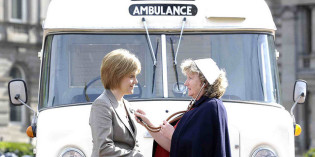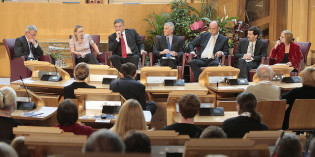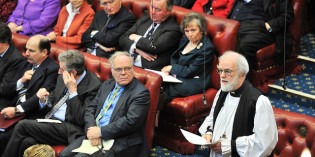Tag: Norman Bonney

The best of Democratic Audit’s 2014 coverage of Scotland’s democratic future
2014 was a momentous year for democracy north of the border, with long serving Alex Salmond stepping down to be replaced by the first female First Minister Nichola Sturgeon. More dramatically still, the country decided its future, opting to stay within the UK, despite a spirited ‘Yes’ campaign which can legimitamtely claim to have changed […]

If implemented in full, the Smith Commission report will provide Scotland with a welcome range of new powers
The Smith Commission which looked at future options for the governance of Scotland in the post referendum landscape. Norman Bonney assesses the document, looking at its proposals on local governance, Air Passenger Duty, the continuing UK framework, and the new respective roles of the Scottish Parliament and Government, concluding that the range of powers offered are […]

“Not bad for a 28-page report”: Experts respond to the Smith Commission’s proposals on Scottish governance
The Smith Commission yesterday published its official recommendations for the future of Scottish governance following the Scottish independence referendum. Democratic Audit asked Iain McLean, Coree Brown, Norman Bonney, Craig McAngus and Paul Cairney to give their views on the proposals and their implications. (Part 2 can be found here.) Similar PostsThe best of Democratic Audit’s 2014 coverage of […]

The Scottish Parliament should not have sovereign power because it serves the Scottish Government rather than holding it to account
The closest thing that the UK has to a written constitution is the legal and political fact of the sovereignty of the Westminster Parliament, something which remains the case in Scotland even since the creation of the Scottish Parliament in 2001. However, recent events, according to Norman Bonney, show that the subordination of the Parliament […]

Scotland’s draft interim constitution: clear-sighted and sensible, or an SNP power-play?
The Scottish Government recently published The Scottish Independence Bill: A Consultation on an Interim Constitution for Scotland, the document which would form the basis of the constitutional arrangements for Scotland in the event of a ‘Yes’ vote in the forthcoming independence referendum. Democratic Audit asked expert constitutional thinkers to give their views on whether the […]

The first draft of Scotland’s interim constitution does little justice to the magnitude of the changes envisaged
The Scottish Government yesterday published their draft plan for the constitution of an Independent Scotland. As well as dealing with the political arrangements in the event of a ‘Yes’ vote in September, it also suggested that such a document would enshrine various social and economic rights, as well ensuring that the country became, and remained, […]

If England players must sing the national anthem at the football World Cup, it should not be ‘God Save the Queen’
With the football World Cup approaching, England manager Roy Hodgson is insisting that his players sing the national anthem before each game. We asked a number of democracy experts to share their views on Hodgson’s rule. In the first of a series of posts on this issue, we find a broad consensus that while singing the […]

The dilemmas of the Scottish independence referendum for a unionist and secularist democrat
Strong secularist and unionist Norman Bonney explains how he is tempted to vote ‘yes’ for an independent Scotland to liberate himself from a system that allows Church of England bishops in the House of Lords to contribute to the making of laws not only for England but also for Scotland and the rest of the […]

The current arrangements for the appointment of the membership of Scottish local council education committees offend basic equal opportunity principles
The Education Committees of Scottish Local Authorities are currently obliged to reserve three ‘external’ positions for religious organisations. A recent petition from the Edinburgh Secular Society has sought to reform these arrangements, which date back to legislation from the 1970’s and have, Norman Bonney argues, worrying legal and equalities implications. Similar PostsA ‘Jeffersonian’ wall or an Anglican Establishment: The US […]

The Church of England: an anachronistic religious monopoly ripe for reform
The Church of England’s unique constitutional status gives it a monopoly role as the sole official state institution charged with relations between the UK state and with God. Norman Bonney argues that these arrangements are increasingly inappropriate for the current era, noting that long term trends and more recent experiences make the case for disestablishment. In a country […]


 Democratic Audit's core funding is provided by the Joseph Rowntree Charitable Trust. Additional funding is provided by the London School of Economics.
Democratic Audit's core funding is provided by the Joseph Rowntree Charitable Trust. Additional funding is provided by the London School of Economics.